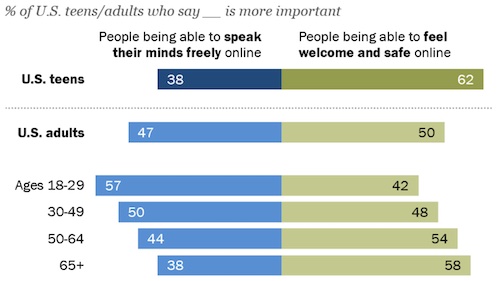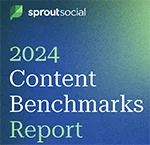The issue of “cancel culture,” as well as current debates surrounding how tech companies should address opinions or content that might be considered offensive, have become divisive topics among bipartisan lawmakers, media outlets and consumers in recent years.
According to a recent survey released by the Pew Research Center, it appears that a majority of U.S. teens today value a digital ecosystem where people feel safe and welcome over one where people are able to speak freely.
Pew’s survey found that nearly two-thirds (62 percent) of Americans ages 13 to 17 believe that offering a welcoming, safe Internet is more important than providing a forum where people are able to speak their minds. Only slightly more than a third (38 percent) of teens said they prefer an online environment where people are able to say whatever they want.
 |
| A majority of U.S. teens think feeling welcome and safe online is more important than being able to speak freely, compared to a much smaller number of adults who believe this. |
By contrast, a separate Pew survey of U.S. adults (Americans 18 and older) finds these views to be somewhat more evenly divided. For example, more than half (57 percent) of Americans ages 18 to 29 think it’s more important that people have the ability to speak their minds freely online. On the other hand, 58 percent of older Americans (those 65 and older) seem to agree with teens’ views on the issue, preferring a welcoming, safe Internet over one where people can say whatever comes to mind. Overall, half (50 percent) of U.S. adults value a welcoming, safe online environment, while 47 percent put an emphasis on providing a forum where freedom of speech is the guiding rule.
However, teens appear to agree with adults on the issue of online speech in some surprising ways. For example, a majority of teens polled (59 percent) said they think too many people today take things that are said online too seriously. This is actually higher than the percentage of U.S. adults (54 percent) who said the same. Moreover, the age group who most believe that offensive content online is taken too seriously skews young, belonging to Americans between the ages of 18 to 29 (62 percent).
Partisanship appears to play a greater role than age in determining one’s personal value of safety and free speech online, as opinions on the issue contrast most starkly along partisan lines for respondents across all age groups.
Nearly three-quarters (71 percent) of teens who identify as Democrat or Democrat-leaning think it’s paramount that people feel safe and welcome online, compared to only 49 percent of Republican or Republican-leaning teens. Meanwhile, 72 percent of conservative-leaning teens think people take offense too quickly to things they see online, while only 49 percent of teens identifying as Democrat or Democrat-leaning agree.
The same pattern follows with adults. Nearly two-thirds (62 percent) of Democrat-identifying adults think people need to feel welcome and safe online, compared to only about a third (36 percent) of conservatives, and 67 percent of Republican-leaning adults think people take offense to things too easily, while only 43 percent of Democrat-leaning adults agree with this.
Pew’s study was based on data drawn from two separate surveys, one that polled more than 1,300 U.S. teens ages 13 to 17 between April and May 4 and another that polled more than 3,500 U.S. adults in March.


 What if companies could harness the fury of online outrage into a force for good? This is precisely where companies can start turning the trolls into brand champions.
What if companies could harness the fury of online outrage into a force for good? This is precisely where companies can start turning the trolls into brand champions. Audiences interacted with brand content far more often on Facebook and Instagram in 2023 than they did via X (formerly Twitter), according to a report that tracked engagement trends across different social networks.
Audiences interacted with brand content far more often on Facebook and Instagram in 2023 than they did via X (formerly Twitter), according to a report that tracked engagement trends across different social networks. Can public relations help counteract the dissension fostered by the power of digital platforms to spread hate, fear and confusion?
Can public relations help counteract the dissension fostered by the power of digital platforms to spread hate, fear and confusion? The number of Americans who get their news from TikTok has quadrupled in the last three years, according to a recent Pew Research Center report.
The number of Americans who get their news from TikTok has quadrupled in the last three years, according to a recent Pew Research Center report.


 Have a comment? Send it to
Have a comment? Send it to 
No comments have been submitted for this story yet.